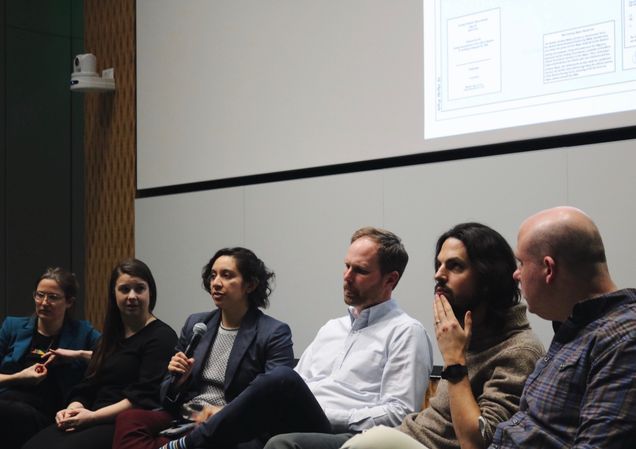Urban Studies Capstone Course Holds Panel Discussion With Advisory Board

On February 11th, the Urban Studies Capstone Class (MET UA 805) held a panel discussion with the project advisory board for the course. The discussion included four presentations by Matt Resseger, Eric Halvorsen, Jessica Martinez, and Matt Smith. The presentations discussed research, urban design methods, community engagement, and revitalization programs. Following the presentations, students got the opportunity to ask advisors questions to inform the decision-making process on their projects.

This Spring, the Capstone class is working with the City of Hyde Park on six projects that are either focused on developing green spaces or boosting economic development in the city. The course is co-taught by Professor Madhu Dutta-Koehler, Ph.D. and Matt Smith MCP ‘19, but allows students to get hands-on experience in a non-traditional classroom. During the discussion, the panelists and speakers brought up important information that students were then able to apply to their projects. The projects require intensive research on the City of Hyde Park and the speakers reiterated the importance of this research during their presentations.
“Using data to tell a story is one of the most important things to do as a planner,” said Matthew Resseger.
Additionally, the speakers encouraged students to look to the community to answer many of the questions that they may have about their projects. Considering that the projects are meant to improve the lives of residents, the groups have to focus on what residents actually want.
When asked the question: “How do we create a project applying social and environmental value that can also be justified by its financial value”, the panelists were able to give a variety of insights. Responses varied from working with nonprofits to providing culturally relevant uses. However, Eric Halvorsen offered an insight that’s often overlooked, “Sometimes you don’t need an economic justification. Sometimes you do things solely because there are social and environmental benefits,” Halvorsen said.

The running theme of the night was that urban design is a creative and collaborative process. Developing solutions to the problems faced by many cities requires creativity and innovation. The panelists suggested collaborating with residents, property owners, NGOs, and others to ensure that their projects are as effective as possible. However, it’s even more important that students collaborate with their fellow group members.
Imani Roberson, CAS’20/COM ’20